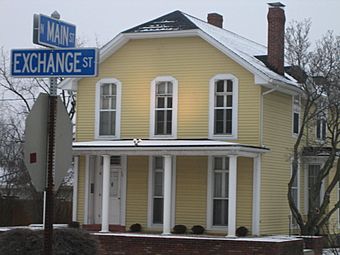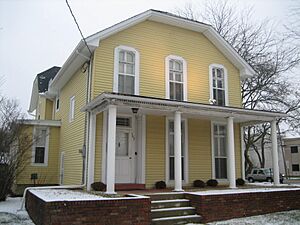D. B. James House facts for kids
Quick facts for kids |
|
|
D. B. James House
|
|
|
U.S. Historic district
Contributing property |
|

The front gable of the James House is a roof style known as a Jerkinhead.
|
|
| Location | Sycamore, DeKalb County, Illinois, USA |
|---|---|
| Built | c. 1858-62 |
| Architect | Hammond & Carlson |
| Part of | Sycamore Historic District (ID78003104) |
| Added to NRHP | May 2, 1978 |
The D. B. James House is a cool old building in Sycamore, Illinois. It's part of the Sycamore Historic District, which is like a special neighborhood. This district was added to the National Register of Historic Places in 1978. That means it's an important place in American history. The James House is one of 226 buildings in this historic area. You can find it on the corner of Exchange and Main Streets, right behind the DeKalb County Courthouse.
Contents
Discover the Historic D. B. James House
This house has a lot of history! It was built a long time ago, around 1858 to 1862. It's named after its first owner, Daniel B. James. Today, the D. B. James House is still used as a law office, just like it was when Daniel James lived there.
Who Was Daniel B. James?
Daniel B. James was the first person to own this house on Exchange Street. He was born in Vermont in 1817. Before moving to Illinois, he worked as a lawyer in Vermont.
- In 1852, he moved to Illinois after spending some time in California.
- He helped start the Republican Party in Sycamore. This was a new political group at the time.
- In 1857, he also helped create a local newspaper called the Sycamore True Republican.
- From 1865 to 1869, Daniel James served as a county judge. This meant he made important decisions for the county.
- He passed away in 1877 and is buried at the Elmwood Cemetery in Sycamore.
A Look at the House's Past
Old maps of Sycamore from 1892 and 1894 show that the James House was one of only two homes on its block of Exchange Street. By the early 1900s, many more houses had been built around it.
- When the house was added to the National Register of Historic Places, its building date was listed as 1862.
- However, old newspaper stories say that Daniel B. James hired a company called Hammond & Carlson to design the house even earlier, in 1858 or 1859.
- It's interesting that the house is still used as a law office today, just like it was when Daniel James lived there!
Unique Architecture of the James House
The D. B. James House has a very special roof style. The front part of the roof is called a "Jerkinhead" roof. This is a mix between a regular gable roof and a hipped roof.
- A Jerkinhead roof starts like a normal gable, going up vertically.
- Then, about halfway up, the roof tilts back at a steep angle. This makes it look unique!
- The house used to have a three-story tower at the back. This made it stand out even more than it does now.
- The windows facing Main and Exchange Streets are very tall, reaching from the floor to the ceiling.
- On the east side of the house, the three second-floor windows are set in raised gables. Each of these smaller gables also has its own tiny Jerkinhead roof!
- The porch you see on the house today is not the original one. But it's still quite old, dating back about thirty years.
 | Laphonza Butler |
 | Daisy Bates |
 | Elizabeth Piper Ensley |


